위키 구독하기
Share wiki
Bookmark
Poloniex
0%
Poloniex
Poloniex(2013년 설립)는 100개 이상의 비트코인 (BTC) 시장을 거래할 수 있는 미국 암호화폐 거래소입니다. 고객에게 안전한 거래 환경과 고급 차트 및 데이터 분석 도구를 제공합니다. 이 플랫폼을 통해 사용자는 LTC, 네임코인, 도지코인 등과 같은 암호화폐를 사고 팔 수 있습니다.[7]
역사
2014년 3월, Poloniex는 해커 공격을 받아 보유하고 있던 모든 비트코인의 12.3%를 잃었습니다. 3월 4일 공격이 발생했을 때 중단되었고 서비스는 하루 동안 중단되었습니다. 5일 시장이 동결 해제되었고 CEO D’Agosta는 모든 잔액을 균등하게 조정하여 12.3%를 잃는다는 결정을 내렸습니다.[9] 서비스는 책임을 완전히 인정하고 손실된 모든 것을 지불할 계획입니다. 일부는 자체 자금으로, 일부는 수수료를 0.2%에서 1.5%로 인상하여 충당합니다.[8] 2016년 9월, 규제 변경으로 인해 Poloniex는 뉴햄프셔에서 서비스를 종료하고 새로운 마진 포지션 개설을 위한 모든 계정을 중단한다고 발표했습니다. 2017년 7월, Poloniex는 상원 법안 5031 또는 통일 화폐 서비스법 제정에 따라 워싱턴 주에서 운영을 중단한다고 발표했습니다. 2017년 5월, 로펌 Berns Weiss LLP는 최근 DDoS 공격으로 인해 손실을 입었을 수 있는 암호화폐 거래소 사용자를 대신하여 잠재적 청구를 조사하고 있다고 발표했습니다. Poloniex는 5월 8일에 심각한 분산 서비스 거부(DDoS) 공격을 받아 많은 레버리지 포지션이 청산되었습니다. Berns Weiss LLP는 Poloniex에 대한 DDoS 공격이 발생한 지 몇 분 만에 대규모 이더리움 매도 주문이 실행되었다고 주장합니다. 이는 이더리움 가격을 낮추고 따라서 마진 콜에 배치된 포지션을 청산할 만큼 충분한 양의 매도 주문이었습니다. 거래소의 많은 사용자는 시장 조작, 심지어 내부자 거래의 피해자라고 생각합니다. 2017년 10월, 보안 연구원은 Poloniex 암호화폐 거래소와 관련이 있다고 주장하는 두 개의 사기성 앱을 Google Play 스토어에서 발견했습니다. 가짜 앱은 Poloniex 로그인 자격 증명을 수집하는 것 외에도 피해자를 속여 공격자가 Gmail 계정에 액세스할 수 있도록 시도합니다.[10] 2017년 12월, Poloniex는 플랫폼을 사용하는 모든 거래자가 신원을 확인해야 한다고 발표했습니다. 얼마 전 Poloniex는 모든 신규 등록자를 위한 신원 확인 프로세스를 구현하기 시작했습니다. 당시 레거시 계정 보유자는 신원 자격 증명을 제출할 필요가 없는 특권을 받았습니다. 이제 Poloniex는 모든 사용자에게 레거시 계정이 신원을 확인해야 하거나 확인되지 않은 계정이 폐쇄된다는 통지를 발행했습니다. 이 마감일의 정확한 날짜는 2018년 1분기에 발표될 예정입니다.[1] 2018년 2월 2일, 기술 블로그 Modern Consensus는 다중 통화 송금 앱인 Circle이 Poloniex를 인수하기 위해 노력하고 있다고 보도했습니다. Modern Consensus는 잠재적 거래에 대한 정보를 가진 익명의 소스 2곳을 인용했습니다. Circle과 Poloniex 모두 그러한 거래를 부인했습니다.[2] 2018년 2월 26일, 암호화폐 스타트업 Circle이 디지털 토큰 거래소 Poloniex를 인수했습니다. 두 회사 모두 Circle이 때때로 20억 달러 이상의 일일 거래량을 기록한다고 밝힌 시장에 대한 통제권을 부여하는 거래 가치를 공개하지 않았습니다. Fortune 잡지는 이 문제에 정통한 사람을 인용하여 거래 가치가 4억 달러라고 밝혔습니다. 2020년 초, Poloniex는 주요 거래소 Binance와 합류하여 Steemit의 소프트 포크를 되돌리려고 했습니다. 소프트 포크는 TRON(TRON)이 암호화폐에 미치는 영향을 제한하기 위해 수행되었습니다. 2020년 6월, Poloniex는 Bitfinex 및 Tether에 대한 소송에서 피고로 추가되었습니다. 소송은 Poloniex 및 기타 거래소가 달러 예금으로 완전히 뒷받침되지 않는 Tether를 서로 주고받았다고 주장합니다.[3]
특징
Poloniex를 통해 고객은 비트코인 또는 알트코인과 관련된 변동성 문제 없이 거래소 및 블록체인에서 법정 화폐로 거래할 수 있습니다. Poloniex는 대부분의 고객 예금을 오프라인 에어 갭 콜드 스토리지에 보관합니다. 활성 거래를 용이하게 할 만큼만 유지하여 위험과 노출을 최소화합니다. 자금은 부분 지급 준비율 대출에 사용되지 않습니다. 거래소는 매일 수억 달러의 거래량을 기록합니다.[4] 이 회사는 또한 마진 거래를 제공하여 사용자가 이자율로 이더리움 또는 비트코인에 투자하기 위해 돈을 빌릴 수 있도록 합니다. 또한 30일 이동 평균으로 거래된 비트코인 수에 따라 거래 수수료가 0.05% - 0.40% 부과됩니다. 가장 낮은 구간은 600 비트코인 미만이고 가장 높은 구간은 120,000 비트코인 이상입니다.[5] 현재 Poloniex는 라이트코인, 대시, 지캐시, 바이트코인, 스팀, 오미세고, 이더리움 클래식, 리스크, 그노시스, 스트라티스, 모네로, 넴, 리플, 팩톰, 브이캐시, 스텔라 루멘, 버트코인, 비트셰어 등을 지원합니다.[6]
Poloniex & Binance
Poloniex는 Justin Sun이 Steem을 처리하는 것에 대한 CZ의 최근 비판에도 불구하고 Binance Coin 및 Binance USD에 대한 지원을 시작했습니다. Tron 설립자 Justin Sun을 포함한 컨소시엄이 최근 인수한 베테랑 거래소인 Poloniex는 Binance Coin(BNB) 및 Binance USD(BUSD) 페어링을 출시했습니다. 6월 6일 현재 BNB 및 BUSD 지갑이 거래소에서 라이브로 제공되며, 해당 페어링 시장은 전체 거래 기능이 출시되기 전에 안정성을 보장하기 위해 게시 전용 모드로 출시될 예정입니다.
- Poloniex에 상장된 Binance 토큰
상장을 통해 6개의 새로운 페어링에 대한 지원이 제공되며, Binance Coin은 이제 BUSD 외에 비트코인(BTC), 테더(USDT) 및 트론(TRX)과 거래할 수 있으며, Binance USD는 USDT 및 BTC에 대해서도 지원됩니다. BNB는 현재 시가 총액 27억 6천만 달러로 8번째로 큰 암호화폐입니다. BUSD는 시가 총액 기준으로 49번째로 큰 암호화폐 자산이지만 테더 및 USD 코인에 이어 세 번째로 큰 스테이블 코인입니다.
논란
Poloniex, Bittrex 및 Roche Freedman LLP
Bittrex와 Poloniex는 로펌 Roche Freedman LLP가 자신들을 상대로 제기된 특정 집단 소송에서 제외되기를 원합니다.
암호화폐 회사는 2020년에 여러 거래 플랫폼을 상대로 집단 소송을 제기했으며, 소송은 여러 중앙 집중식 거래소가 테더(USDT)를 사용하여 암호화폐 가격을 조작했다고 주장합니다.
그러나 변호사이자 Roche Freedman의 창립 파트너인 Kyle Roche는 Crypto Leaks에서 일련의 비디오를 게시한 후 소송에서 자신을 제외했습니다.
비디오 클립에서 Roche는 다양한 암호화폐 비즈니스와의 관계에 대해 논의합니다. 변호사는 클립에 "정확한 맥락으로 제시되지 않은 수많은 출처 없는 허위 진술과 불법적으로 획득하고 고도로 편집된 비디오 클립이 포함되어 있다"고 주장합니다. Roche의 변호에도 불구하고 그는 여러 고위 암호화폐 소송에서 철회하기로 결정했습니다.
향후 계획
Justin Sun의 Tron은 블록체인 기반 분산형 플랫폼으로 Poloniex에 투자하고 있습니다. Tron은 Circle에서 2019년에 분사되기 전에 거래소에 1억 달러를 투자한 그룹의 일부였습니다. Tron의 도움으로 Poloniex는 분산형 금융 공간에 집중하고 있습니다. Poloniex는 블록체인 프로젝트의 성장을 돕기 위해 초기 거래소 제공(IEO) 플랫폼을 출시했습니다. LaunchBase라고 하는 IEO 플랫폼은 Tron과 협력합니다. LaunchBase는 토큰과 전문적인 조언을 제공하여 사용자 채택을 촉진하는 데 도움이 됩니다. Poloniex는 한때 암호화폐 결제의 상당 부분을 용이하게 한 주요 거래소였습니다. 그러나 Circle에서 분사될 당시 거래소의 총 시장 가치는 급격히 하락했습니다. 2021년 3월 1일 현재 Poloniex는 달러 가치 거래량 기준으로 13번째로 큰 암호화폐 거래소였으며, 지난 24시간 동안 2억 3,600만 달러를 기록했습니다. 한편 Binance는 거의 250억 달러가 거래되어 1위를 차지했습니다.
잘못된 내용이 있나요?
